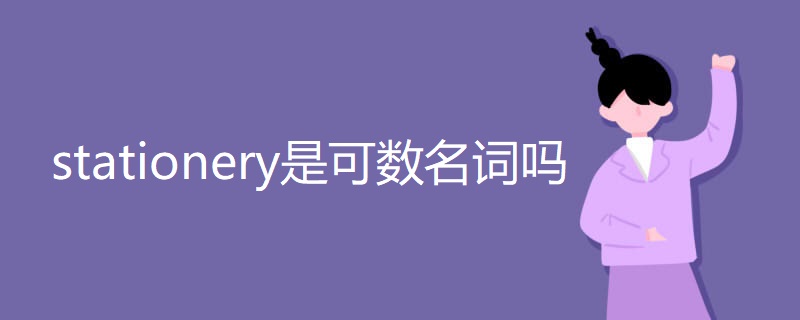-
-
stationery是不可数名词,是集合名词,没有复数形式。Stationery基本意思是文具;信纸;信笺。例句:I loved stationery and all the accoutrements of writing.我喜爱信笺信封和所有文房用具。

stationery的双语例句
Pens and stationery are placed in the stationery holders.
钢笔和文具放在文具盒里。
Pens,stationery and stamps can all be tucked away in the plentiful drawers of a secretary like this.
笔,信纸和邮票都能在这书台繁多的抽屉里藏好。
I follow people who often are good sources of cool craft projects,links to artists selling stationery and the like.
我则会关注一些了解很酷的工艺项目的人以及有关艺术家出售文具等用品的链接。
I very much hope these notebooks I see in stationery stores,card shops,and bookstores are serving similar purposes.
我十分希望那些我在文具店、卡片店和书店看到的记事本都有相近的用途。
英语集合名词的分类
1、形式为单数,但意义可以用为单数或复数。
这类集合名词包括:family(家庭),team(队),class(班),audience(听众)等。其用法特点为:若视为整体,表示单数意义;若考虑其个体成员,表示复数意义。
2、形式为单数,但意义永远为复数。
这类集合名词包括:cattle(牛,牲畜),people(人),police(警察)等。其用法特点为:只有单数形式,但却表示复数意义,用作主语时谓语用复数;不与 a(n) 连用,但可与the连用。
3、形式为复数,意义也为复数。
这类集合名词包括:goods(货物),clothes(衣服)等。其用法特点是:只有复数形式,当然也表示复数意义,用作主语时谓语也用复数,但通常不与数词连用。
4、形式为单数,意义也为单数。
这类集合名词包括:baggage/luggage(行李),clothing(衣服),jewelry(珠宝),equipment(设备)等。其用法特点为:是不可数名词,只用单数形式,不用不定冠词(当然更不能用数词),没有复数形式。